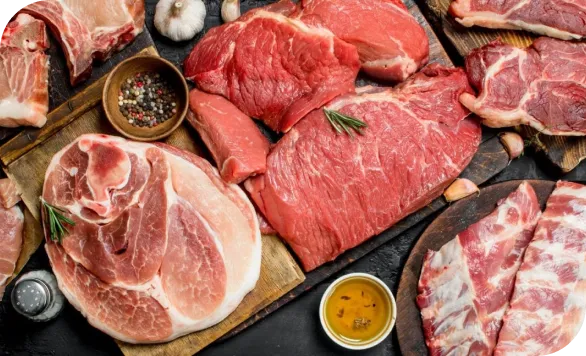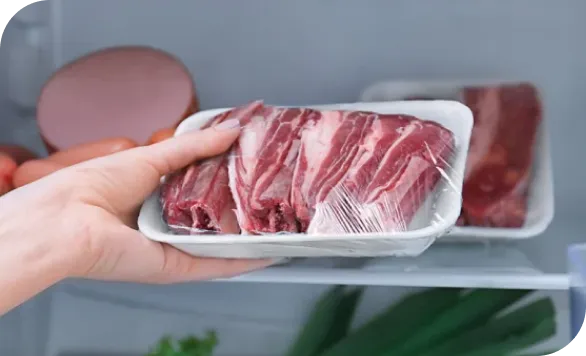



01
Sourcing
Sourcing the best livestock, processing to make international quality products and utilising the supply chain to reach the consumer with the freshest produce are the USPs of MMC.




02
dressing
The livestock is inspected by DADH veterinarians twice, once before slaughter and once after, to ensure that the animals are disease-free and fit for human consumption. The inspection process follows Good Manufacturing Practices (GMP) and Good Hygiene Practices (GHP).
03
Processing
The animals are slaughtered in an abattoir according to Halal regulations. Then, a post-mortem examination is conducted before the carcass is washed, stamped, and transferred to a chiller. Before butchering, the pelt is removed and the innards are taken out. Finally, expert veterinarians inspect the meat to ensure it is fit for human consumption.




04
cutting
Large animals are cut into three pieces before being cut into smaller pieces like ribs - Carcasses are kept in a chiller at 2-4⁰ C for 24 hours - After the carcass temperature and pH have gone down, the carcass is brought to a deboning hall for further processing - Various prime cuts are prepared here and then packed.
05
Grading
Each carcass is washed and sanitized with approved disinfectants to control microbial contamination and growth. Meat is given a grade depending on the animal’s size, muscle mass, and fat deposits. It is then stamped as ‘veterinary passes’ under close supervision of the Chief Veterinary Officer (CVO) under a strict quality control procedure.




06
PACKAGING AND DISTRIBUTING
The meat is cut, put into plastic bags, and vacuum sealed. It is then kept in a blast freezer for 10-12 hours to bring the core temperature of the product to -18°C. The final cartons are passed through the metal detector to check for external contaminants. Frozen cartons are kept in cold storage at -18°C for further dispatch.


Quality

Quality
The Mumbai Meat Company implements comprehensive quality management consistently at all production levels. We do 150 quality checks from the time of animal arrival until frozen or chilled meat dispatch. Finished products are checked for microbiological testing, chemical analysis, heavy metal, natural toxic substance, crop contaminants, hormones and preservatives. We use a consistent HACCP system (Hazard Analysis and Critical Control Points) to analyze food safety risks. We also conduct varied internal checks and external audits of the processes and products at every stage.
Food Safety
From animal selection to several production checkpoints, we ensure high food safety at every step. Each animal we slaughter is examined by Government official veterinarians and the carcass enters the food chain only after it has been determined to be fit for human consumption by the official ante mortem and post mortem checks. By working closely with our suppliers and customers, we are responsible for producing food that is as safe as possible. We also make every effort to make the ingredients and preparation standards of our products clear to the consumer.
Food Safety

REGULATORY COMPLIANCES
The Allana Processed Food Division ensures Quality and Food Safety by implementing the following International Standards and Systems:

Quality
Management
Systems - QMS
(ISO 9001:2015)

NABL
(ISO 17025:2017)

APEDA
FSSAI

HACCP
Food Safety System
(Preventive Controls).

Food Safety
Management
System - FSMS
(FSSC 22000:2018)


